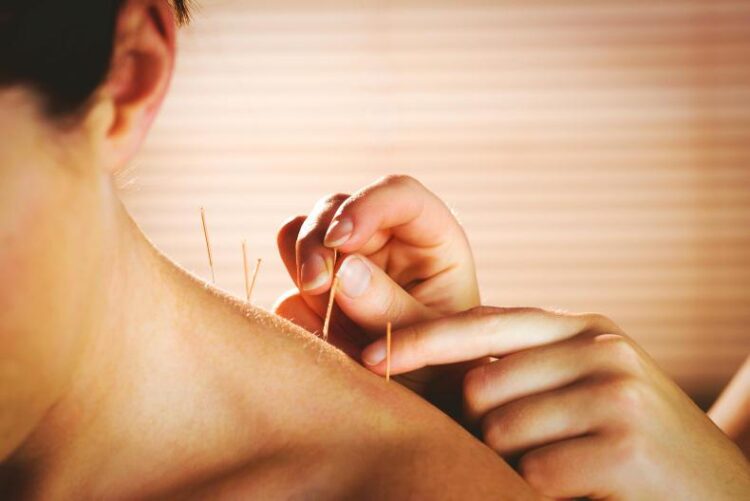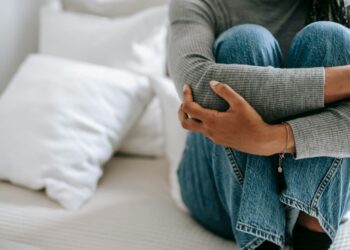Could this traditional Chinese therapy be the treatment you need to finally ease headaches, fertility issues, digestive problems and more?

There are some alternative therapies that we have our doubts about, but when it comes to treatments like acupuncture, the results speak for themselves. It is even now covered by most health insurance plans. So what is it, and who can benefit from it?
WHAT IS ACUPUNCTURE?
Acupuncture is a traditional Chinese therapy that has been around for thousands of years. It involves inserting very fine needles into the body, at various points, to stimulate nerve endings, lumphatics and capillaries, and alleviate blockages. It’s widely acknowledged as benefiting fertility, depression, allergies, digestive problems and more, and is available on most health insurance plans.
SO HOW DOES IT WORK? (AND DOES IT HURT?)
We caught up with Eva Heffernan, Secretary and member of the Acupuncture Council of Ireland to find out more about this ancient Chinese philosophy:
Can you briefly describe what acupuncture is and where it came from?
Acupuncture is a form of traditional Chinese medicine which has been used for thousands of years. It can be used for therapeutic or preventative purposes and can play a major role in treating a range of conditions. The practice of acupuncture involves very fine needles which are inserted into acupuncture points, which lie at specific predetermined anatomical locations. The fine needles used during acupuncture stimulate the body’s energy, Qi (pronounced “chee”) to start the healing process and help the body restore its natural balance.
What common ailments would you treat clients for?
Acupuncture is used to treat a range of conditions and the World Health Organisation (WHO) supports its use in the treatment of conditions such as arthritis, fertility, pain, headaches, depression, stress, allergies and much more. Treatment with acupuncture can alleviate symptoms associated with mental health issues by treating the root cause of the problem and helping to rebalance the body’s internal environment. The benefits of acupuncture extend to a wide variety of conditions, including emotional disorders such as anxiety and depression and digestive complaints including nausea, vomiting and irritable bowel syndrome. Acupuncture can relieve discomfort associated with a variety of diseases and conditions, but it’s important to only use a registered acupuncturist.
Treatments are tailored, by a registered acupuncturist, to each individual taking into consideration all of their physical and emotional symptoms as well as diet and lifestyle factors. Acupuncture is becoming a common topic of discussion amongst doctors and GPs, particularly in a peer to peer review setting, including doctor referrals.
Briefly describe how a treatment session goes?
An initial consultation including treatment lasts from an hour to 90 minutes, depending on your condition. The practitioner will take a detailed case history (including your medical case history and GP contact details) and may ask you questions about your family history, diet, your emotional status and social habits. The practitioner does not see you as somebody with a particular named condition, but rather as a person who has a particular imbalance which requires a holistic approach. Acupuncture treats the whole person and not just their presenting condition in isolation. Having taken a detailed case history, the practitioner may look at your tongue and spend time taking your pulses. Having arrived at a diagnosis and treatment protocol, the practitioner will outline this to you, and together, you take it from there.
How does it work on a physical level?
On a physical level, acupuncture stimulates the body’s ability to heal by correcting imbalances in a person’s energy or Qi. There are 14 major energy-carrying channels in the body which are called meridians. On these meridians, are hundreds of acupuncture points. During an acupuncture treatment, various points are identified and used by the practitioner to correct any disruption of energy in the body and alleviate related symptoms. Placement of the acupuncture needle in the body releases sensory nerves which trigger the brain to release endorphins and pain receptors. It also stimulates the release of molecules associated with tissue healing and disease resolution.
How does it work on an energetic level?
In acupuncture, emotions relate to each organ, for example, fear to the kidneys; worry to the spleen; anger to the liver; joy to the heart and grief to the lungs. If any of these emotions are extreme in our body, the associated organ and its function and energetics, in time, will be affected. For example: constant worry and overthinking and excessive mental work can affect our digestive system which impacts on our energy, production of qi, blood and fluids (in Chinese medicine terms), leading to a variety of physical issues such as diarrhoea, weight gain, body weakness, tiredness, as well as reducing our mental capacity for thinking, memorising, concentration and emotional stability.
What are the biggest reservations people have when it comes to acupuncture?
People are often wary of needles and think acupuncture will be painful, but the needles are very fine and flexible, so you don’t feel any pain at all. When practiced by a qualified practitioner, acupuncture is safe. It is a completely natural therapy and works directly with the body’s natural processes, avoiding negative side effects. The needles are sterile and only used once, therefore don’t carry any risk of infection and the treatment can be used in conjunction with your medication.
Why is acupuncture recommended for fertility?
Acupuncture naturally helps regulate the female body and the male to encourage natural conception. Acupuncture will work on regulating your hormones, balancing your menstrual cycle and correcting any issues which may be hindering fertility such as painful or irregular periods, PCOS, endometriosis or simply stress. It can also be used alongside treatments for fertility in IVF clinics. Similarly, it’s a natural treatment option to be used for expectant mothers for symptoms including morning sickness, hyperemesis and heartburn, as well as its use in preparation for labour and post-partum (birth) issues.
Generally speaking how much does it cost and how many treatments do you need?
Typically, acupuncture costs between €40 to €60 per treatment and can be claimed back on health insurance once you use a registered practitioner such as those registered with the Acupuncture Council of Ireland. The number of treatments required will depend on factors; how long you’ve had your condition, your age, lifestyle and so on. A course of six to ten treatments is typically recommended, while fertility treatments can take three to six months.
What should people look for when they’re choosing a practitioner?
It’s important to only use a registered acupuncturist, as this guarantees that they have a minimum of three years’ training. The Acupuncture Council of Ireland has 500 members nationwide and is responsible for the regulation and maintenance of a Register of Acupuncturists. Members of the ACI are approved by Aviva, VHI, Laya Healthcare and HSA for Out-Patient insurance purposes. To find a registered acupuncturist in your area visit www.acupuncturecouncilofireland.com.








